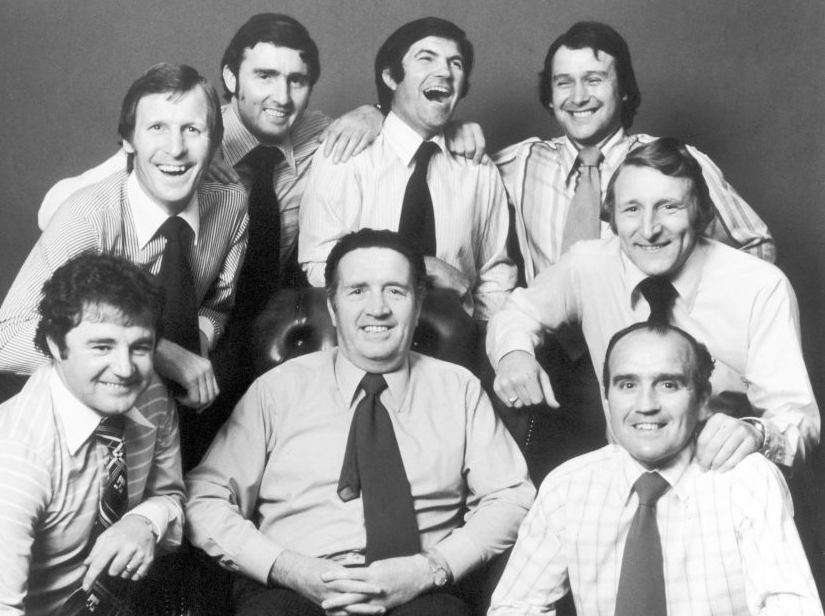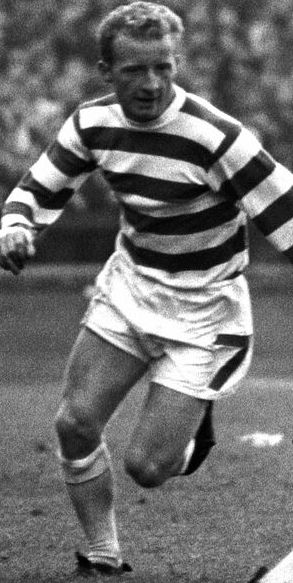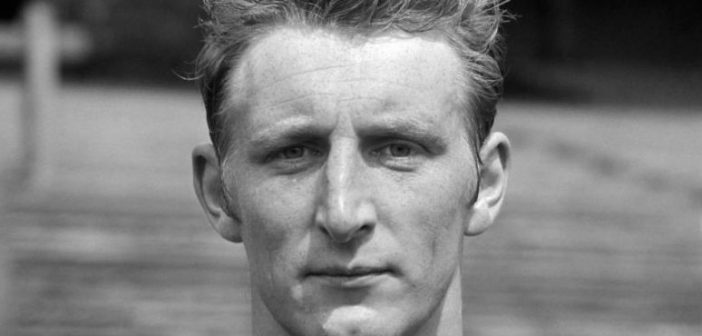CELTIC’S legendary manager Jock Stein was born on this day in Burnbank, south Lanarkshire, in 1922.
There have been many tributes paid to the man who transformed the team from east end misfits to European masters.
This is an extract from Lisbon Lion Tommy Gemmell, who sadly passed away on March 2 last year. The goalscoring full-back had an interesting insight into the iconic boss’ way of thinking as he revealed in his autobiography, ‘All The Best’, co-authored by Alex Gordon and published by CQN Books in 2014.
Here is an extract from a very interesting chapter in the Big Shot’s own words.
Jock Stein never said it to my face, but I had been informed by some of his closest associates that he regarded me to be the best left-back in the world.
But it was the same Jock Stein who restricted my international appearances for Scotland to a mere eighteen. No doubt a lot of people will find difficult to comprehend or even believe that statement. Take it from me, it’s the truth.
After my debut in 1966, if anyone had told me I would represent my country only another seventeen times in a playing career that stretched a further nine years, I would have guessed I was the victim of a wind-up. Unfortunately, the history books show that to be an absolute fact. And that was down to one individual – Jock Stein.
Big Jock was always a difficult man to argue with. At Celtic, his word was law. When an international game was on the horizon and I was a cert to get a call-up, Jock would sidle up to me and I had a fair idea of what was coming next. ‘You don’t want to be bothered playing against that lot, do you?’ he would ask. It was, of course, a rhetorical question.
If Scotland were preparing for a match against one of the smaller nations, Jock would have much preferred his players resting before an important club game the following Saturday. He didn’t like his players risking injury in friendlies against the minnows of the football world.
However, if we were due a crucial qualifying encounter in the World Cup or the European Championship, that was a different story. He wouldn’t even attempt to pull any of his players out of those squads. But if he thought it was an international against countries of little stature, then there was always the chance of Big Jock getting a hold of you and letting you know it might be a good idea to withdraw. ‘Say you’ve got a hamstring or something,’ he would ‘advise’ you. ‘I’ll get someone from the club to put in a call for you.’

BIG JOCK’S BHOYS…the Celtic legend with some of his ex-players who were managers at the time: from back left clockwise: Billy McNeill (Celtic), Mike Jackson (Queen of the South), Bertie Auld (Partick Thistle), Willie Wallace (Dundee assistant boss), Tommy Gemmell (Dundee), Willie Fernie (Kilmarnock) and Benny Rooney (Morton).
In those unenlightened times, the SFA would take an individual at his word and clubs weren’t expected to provide a medical certificate to prove you were, in fact, injured. Back in the late sixties and early seventies, the standard international fee was £50 and, once tax and other deductions were made, you were left with around £36.
The SFA knew they didn’t have to throw money at the players because most, if not all, of us would happily have given our services for free. Personally speaking, I know how much it meant to for me to don the dark blue of my nation and how proud it made my entire family. But that would have meant little to the Celtic manager whose concentration would be completely focused on what was happening at a club in the east end of Glasgow.
Jock would add a sweetener – a £50 tax free payment for not representing Scotland. Imagine that, you got more by not playing for your country than you could for playing! Money, of course, had nothing to do with it. You can’t buy those sort of memories, pride doesn’t have a price. But Jock could be very, very persuasive and he was always quick to tell anyone,
‘There are other players out there who are just as good as you and who could do your job for Celtic.’ It was a thinly-veiled threat, of course. He couldn’t actually force you to pull out, but you wouldn’t have to be Einstein to work out you might be putting your first team place in jeopardy if you went against his wishes.
But, please believe me, playing for my country meant the world to me. One of my most magical moments – right up there with Lisbon – was making my Scotland debut against England in Glasgow on the Saturday afternoon of 2 April, 1966. We lost 4-3 to the Auld Enemy, but it couldn’t take away the overwhelming feeling of honour I had when I stepped onto the pitch that day.
Of course, I had been in the Hampden stand to witness Scotland games, but to actually go out there and participate and to be taken aback by the sheer volume of noise and all those waving Lion Rampant flags was just something else altogether. Hampden was just awash with tartan and that was something I had never experienced before as a player.
Naturally, I was used to big and vociferous crowds at Celtic Park, but this was something different. I don’t know about Braveheart, but it made Tommy Gemmell’s heart beat a little faster, I can tell you. I loved it and I revelled in it. That particular memory has a special place in my heart. Jimmy Johnstone netted twice and Denis Law beat the great Gordon Banks with a jack-in-the-box leap to fire a header high into the net. And I remember, too, that we might have got a draw in the last minute when Willie Wallace, later to become a superb Celtic team-mate and loyal friend, had an effort cleared off the line by Nobby Stiles. Now, if that had gone in…
Being asked to withdraw from an international squad wasn’t unique to me, of course. Jimmy Johnstone was easily the best outside-right in the world in his heyday. He could have walked – or waltzed – into any of the great Brazil teams. No argument. How many caps did Jinky pick up? Twenty-three. Bobby Murdoch was one of the best midfielders on the planet. How many caps? Twelve.
The situation involving Bertie Auld was simply downright bizarre. He was one of the most magnificent passers of the ball I have ever seen. He was a crucial cog in the engine room of the Celtic team that conquered Europe and dominated the home and foreign fronts for so long. How many caps? Three. And they were all won back in 1959 and 1960, long before he switched from an orthodox outside-left to a midfield berth where he excelled with his range of passing, incredible vision and quick thinking.
If you ever want to see two guys at the top of their game and taking over the middle of the park to dictate the entire ninety minutes of a football match, just watch a rerun of Bobby and Bertie against Inter Milan in the Portuguese capital in 1967. They were unbelievable. Unstoppable. Unmatchable.
But Big Jock never had to offer Bertie a £50 tax free ‘inducement’ not to play for Scotland. Curiously, Bertie, one of the most wonderful exponents of the measured through ball in football, was never selected for any Scottish squad. To be honest – and I’m not saying it because he is still a very good friend of mine – I find that unfathomable, simply beggering belief.
Did Scotland have so many excellent left-sided midfield players back then that they could continually overlook Bertie? It would appear the selectors thought so. I know it didn’t bother my wee mate one jot. He would look at a pool of players for an upcoming international and say, ‘I must be doing something right – Big Jock keeps picking me for Celtic every week.’
Oddly, every other player who won a European Cup medal would get a call-up at some point afterwards for Scotland. Ronnie Simpson, Jim Craig, Bobby Murdoch, Billy McNeill, John Clark, Jimmy Johnstone, Willie Wallace, Stevie Chalmers, Bobby Lennox and yours truly. However, there was never any sign of the name Bertie Auld.
As my pal might have said, ‘Ach, there’s no accounting for taste.’

WING WONDER..Jimmy Johnstone who won only 23 caps for Scotland.
Mind you, Bertie might not have done too much to push his claims by being sent off on his international debut while playing against Holland in Amsterdam back in 1959. I suppose Bertie was determined to mark the occasion. He has always protested his innocence when fists and boots were flying around in a melee between both sets of players near the end of what had been a fairly explosive encounter which the Scots, incidentally, won 2-1.
However, a Dutch player took a dull one and collapsed as though he had just been struck by a freight train. The referee picked out Bertie as the culprit and he was immediately dismissed. Two games later and that was his international career consigned to the dustbin. Strange things happen in the beautiful game.
Something else Big Jock was fond of informing you was the fact that you were on the payroll at Celtic and Scotland would only pick up the tab whenever they chose to give you a call. ‘Remember who pays your wages every week,’ he would growl. ‘You’ll not be able to pay your mortgage with three or four fifty quids a year.’
He had a point, of course. I’ve no idea if there were any compensation claims back then if a player missed a chunk of games for his club after being injured on international duty. I suppose there was that risk factor to consider, too. Look at Rangers left-back Eric Caldow, for instance. He suffered a broken leg after an accidental collision with England’s big, burly frontman Bobby Smith at Wembley in 1963.
I’m reliably informed that Caldow, so steady and consistent for an Ibrox side that virtually dominated in Scotland in the early sixties, was never quite the same again when he returned. As a matter of fact, rather sadly, Caldow never played for his country again. Did Rangers get a penny? Honestly, I don’t know, but it would have been most unusual in those days for a club to sue the SFA.
By the way, it wasn’t only Big Jock who wasn’t slow to attempt to persuade his players it might be better for them to put their feet up on a Wednesday evening rather than be pitched into an international confrontation. Bill Shankly, at Liverpool, and Matt Busby, at Manchester United, did exactly the same.
Stein, Shankly and Busby, three great Scots. But three great Scots who wouldn’t think twice about asking – or demanding? – their star men have a night off instead of turning out for Scotland. And those managers weren’t alone, either, but they were the most high profile.
Busby, though, was always wasting his time if he tried to get Denis Law to pull out of a Scotland squad. Denis would have none of it and, at the peak of his powers, his would surely have been among the first names on Busby’s team sheet alongside Bobby Charlton and George Best. Not even Busby could have afforded to leave out a fully-fit Lawman.
Denis was fanatical about playing for his country. He was an outstanding patriot and God help the guy who stood between him and a place in the Scotland team. Busby would have had to put him under house arrest to prevent him getting to Scotland to play for his country. If Scotland had arranged a fixture on the moon, you could be sure Denis would have got there somehow, some way. Okay, a slight exaggeration there, but you get the drift.
Denis would often tell me, ‘I loved it when we won and I could go back to Old Trafford and let my English mates Bobby Charlton and Nobby Stiles know how well we had played. The other English guys in the dressing room had to tolerate me going on all week about how wonderful Scotland were. If we lost, though, it was a vastly different story. Then I was apprehensive about what was awaiting me when I returned from a trip to face a dressing room grilling. I was helped by the fact I had Paddy Crerand alongside me and he would always lend his support. But, boy, did they know it when Scotland achieved a good victory. I suppose I must have been difficult to live with in 1967 after we had beaten them on their own midden at Wembley. World champions? We proved who were the best that afternoon. It was 3-2 going on a massacre.’
Sometimes, of course, there were other reasons for Jock not wanting players to turn out for Scotland. Wee Jinky was the direct rival of Rangers’ Willie Henderson for the outside-right position in the international line-up. And, sadly, the Ibrox fans used to give Jinky dog’s abuse when he was chosen ahead of their player, who, by the way, was an outstanding performer in his own right.
Jinky was as courageous a character as I have ever encountered, but being continually booed and jeered while playing for his country did get through to him. You would have required the skin of a rhino for it not to. Jock would see that could affect his performance a few days later for Celtic with the player’s confidence completely sucked out of him.
There were several occasions when Jinky would get the same treatment as myself. ‘I’ll get someone to phone in and say you’re injured or ill, Wee Man,’ Jock would say and a lot of the time Jinky chose to take that line instead of putting himself up for the boo brigade to have a field day at his expense.
Honestly, it was pathetic. Scottish fans jeering their own player? You couldn’t make it up.
* An EXCLUSIVE extract from ‘Tommy Gemmell: All The Best,’ co-authored by Alex Gordon and published by CQN Books in 2014.

